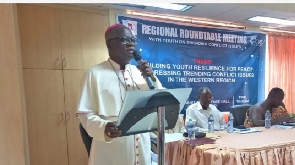The Most Reverend John Baptist Attakruh, the Bishop of the Catholic Diocese of Sekondi-Takoradi, has called on the government and stakeholders to create an enabling environment for the youth to sustain the country’s peace and security.
He said it was imperative for authorities to implement more youth-centred policies, especially those that focused on their economic growth and well-being, to help build resilience against threats of violence in their communities.
The Most Rev. Attakruh made the call at a meeting with the youth on trending conflict issues, organised by the Ghana Catholic Bishops’ Conference, through its Directorate of Governance, Justice and Peace of the National Catholic Secretariat.
It was on the theme: “Building Youth Resilience for Peace: Addressing trending conflict issues in the Western Region” and formed part of the Sahel Peace Initiative of the Catholic Church, with funding support from the Catholic Relief Services (CRS).
It brought together representatives from religious groups, political parties, students, Civil Society Organisations, security agencies and Persons with Disabilities (PWDs), among other groups, to discuss trending conflict issues and devise strategies to address risk of violent extremism among the youth in the Western Region.
Most Rev. Attakruh said there were certain signs and symptoms of potential radicalisation, which could translate into violent extremism in the country, citing the recent chieftaincy issues in parts of the country such as Bawku in the Upper East Region.
He said the youth were susceptible to such issues, saying “We must be proactive and build our youth to be responsible and resilient to be ready for peacebuilding in our country.”
He appealed to individuals to peacefully coexist with each other and build a cohesive and harmonious society to help avert threats of violence in their communities.
Mr Francis Poku, a former National Security Coordinator, who spoke on the topic: “Understanding the root causes of conflicts and violent extremism and the importance of engaging youth in conflict prevention and countering violent extremism,” said issues of bad governance, unemployment, injustices, disputes and use of illicit drugs and substances, among other factors, bred radicalisation among the youth.
He indicated that the current political instability in neighbouring countries and other parts of the Sahel Regions meant that the country was at risk of violent extremism.
He urged stakeholders to institute measures that would check the influx of refugees, create economic opportunities for the youth and empower security agencies to protect the country’s borders, while promoting inclusive governance.
Activities of extremists had not materialized yet in the country due to the peaceful coexistence between all religious sects and called for even stronger bonds to cement the country’s peace, he added.
The Former National Coordinator, noted how Ghanaians had internally lived in fear during the coup days and the urgency to guard the national governance systems to incorporate all and sundry, while satisfying the needs of all to avoid attacks.
Mr. Damien Asobayire, Executive Secretary of Western Regional Peace Council, noted that maintaining peace and stability in the country was a shared responsibility and called on the citizenry to join forces to achieve the goal.
He mentioned illegal mining, land disputes, influx of people and chieftaincy disputes as some early warning signals and in the quest to sustain peace in the Region…”we need to forge a Sustainable peace in the Region.”
Mr Kwabena Okyere Darko-Mensah, the Western Regional Minister, whose speech was read on his behalf, encouraged the youth in the Region to leverage existing government policies meant to promote their well-being to sustain livelihoods.
He urged the youth not to engage in activities that threatened the peace in their communities.
He said the National Youth Authority, through the youth parliament, would continue to solicit the views of all young men and women in the governance processes for equity.
He encouraged the youth to continue to be disciplined and also act as peace ambassadors in their respective communities.
Mr Aaron Felix Opoku, the Programmes Manager at the Cyber Security Authority (CSA), who spoke on “The role of technology in recruitment and radicalisation of the youth,” advised the youth to be vigilant when surfing the internet, including social media platforms in order not to fall victims of internet fraudulent activities.
He recounted that about 39 recruitment scams had been recorded in recent times and involving 98,000 cedis through the technology space and advised the youth not to fall prey.
Mr Opoku recounted how students had unknowingly joined such violent extremist groupings and advised them to shun enticing opportunities on the internet to work, or school abroad without critical scrutiny.
Nana Egya Kwamina XI, Divisional Chief of Apremdo traditional area encouraged the youth to channel their energies and commitment into peace building activities.
He said, “you remain the change makers in our communities, and we are counting on you as our valuable asset for the development of the country.”
Religion of Sunday, 23 July 2023
Source: GNA















